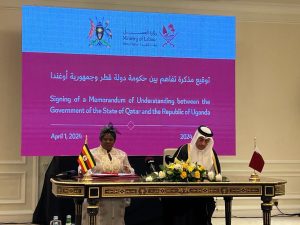The Minister of Gender, Labour, and Social Development, Hon. Betty Amongi Akena, has noted that over 30,000 Ugandans are working in Qatar, hence the need to sign an agreement to enable an organised formal mechanism of labour migration.
The minister made the statement yesterday, April 1, 2024, as she signed a bilateral labour agreement between the government of the State of Qatar and the government of Uganda to facilitate safe and formal labour externalisation to Qatar.
In her speech, Hon. Betty Amongi appreciated her counterpart, H.E. Ali Bin Samikh Al Marri, the Minister of Labour of the State of Qatar, for the hospitality and friendly gesture exhibited to the delegation of Uganda.
The two ministers agreed on the need to monitor recruitment agencies in Qatar to ensure that they respect Ugandan workers’s rights, welfare, and contractual obligations and that recruitment companies abide by what is contained in the agreement.
Amongi also welcomed the proposal from her counterpart for them to immediately establish a joint technical committee to fast-track the implementation of the agreement.

Amongi stated that they agreed to a follow-up meeting on May 27, 2024, to assess the initial progress for the take-off phase of implementing the agreement. According to Amongi, the agreement enables externalising skilled, semi-skilled, and domestic workers.
According to the Ministry of Gender, Labour, and Social Development, Ugandan workers in Qatar have been facing various challenges, including issues related to recruitment fees, withheld passports, low pay, and job instability.
These workers often arrive in Qatar in debt due to high recruitment fees, making them vulnerable to exploitation by employers who withhold wages or delay payments.
Additionally, the Kafala system, although undergoing reforms, still poses challenges for migrant workers, limiting their ability to change jobs and exposing them to subpar working and living conditions.
The lack of freedom of association and collective bargaining rights further adds to the difficulties faced by Ugandan workers in Qatar.
Amongi stated that further information about the agreement will be shared at a later time.
